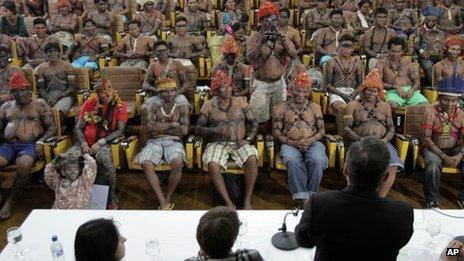Brazil sends army to indigenous land dispute farm
- Published

An indigenous delegation met with government ministers in Brasilia on Tuesday
The Brazilian government has announced it will send soldiers to a farm in the western state of Mato Grosso do Sul.
The ranch is at the centre of a land dispute between its owner - a local politician - and an indigenous group, which has been occupying the property.
A member of the Terena tribe was killed there last week when police moved in to evict the indigenous group.
The Terena have since re-occupied the farm and on Tuesday one was injured in an attack by unidentified gunmen.
Two others have been reported as missing.
Justice Minister Jose Cardozo said about 200 soldiers were being sent to the farm in the Sidrolandia region to prevent an escalation of the situation.
"We're not going to put out the flames by pouring alcohol on the bonfire," he explained. "We must avoid radicalising a situation that goes back a long way in Brazilian history."
Mr Cardozo said he would travel to Sidrolandia to oversee the deployment.
Ancestral dispute
A judge has issued an eviction order for the indigenous group to leave the farm by Friday. The Terena say the ranch lies on their ancestral land.
The dispute is only one of many which is pitching indigenous groups against the Brazilian authorities.
Some 2,000 members of the Kaingang and Guarani groups are blocking highways in Mato Grosso do Sul in protest against the government's decision to halt the granting of ancestral lands to indigenous communities.
And in the Amazon region, the Munduruku indigenous group has been occupying the site where construction is under way on the huge Belo Monte hydroelectric dam, set to become the world's third largest.
On Tuesday, the government met a delegation of indigenous leaders in the capital, Brasilia, in an effort to defuse the situation, which has led to building work on the dam being disrupted since last week.
Brazil's constitution includes a progressive land policy, under which about 13% of the country has been set aside as indigenous territories.
The country's powerful farming lobby has accused the government's Indian affairs office, Funai, of using the policy to seize land settled by farmers more than a century ago, and handing it to indigenous groups.
In response to pressure by the farm lobby, the government agreed last month to restrict Funai's role in land decisions and to temporarily halt the handover of land.
- Published5 June 2013
- Published1 June 2013
- Published30 May 2013
- Published22 March 2013